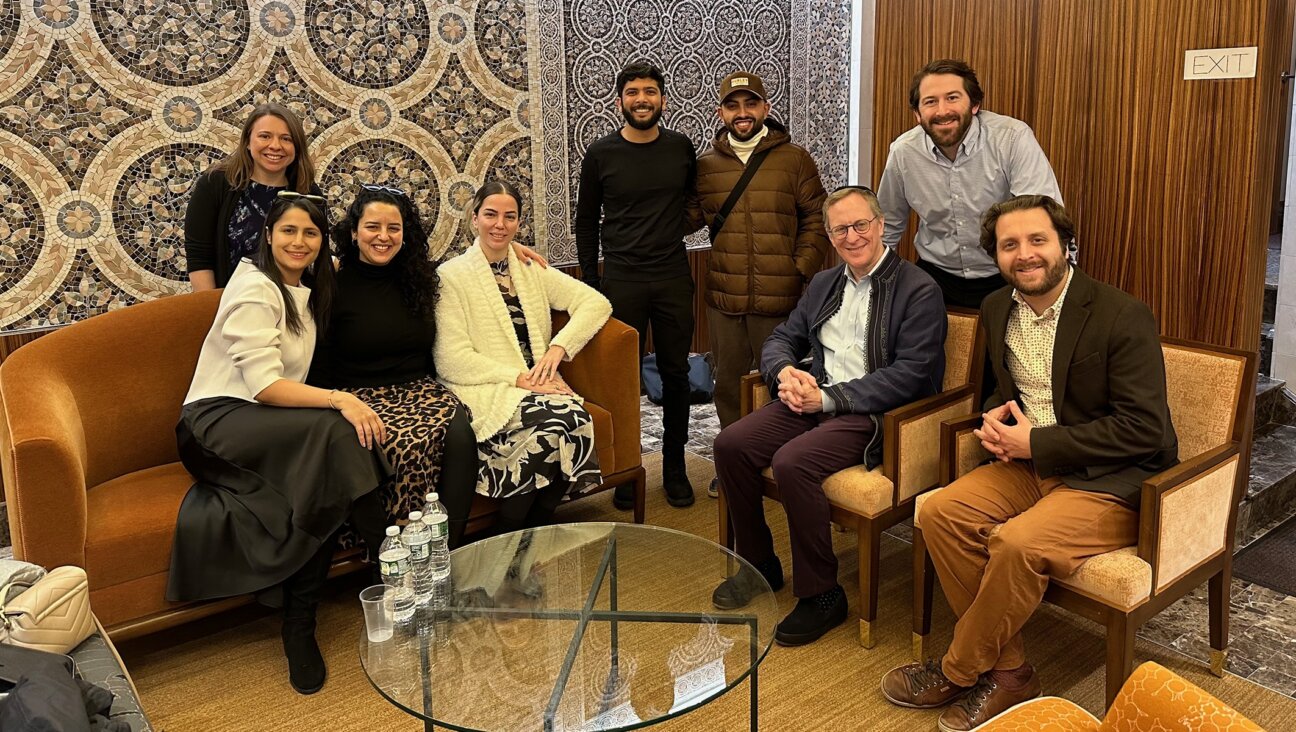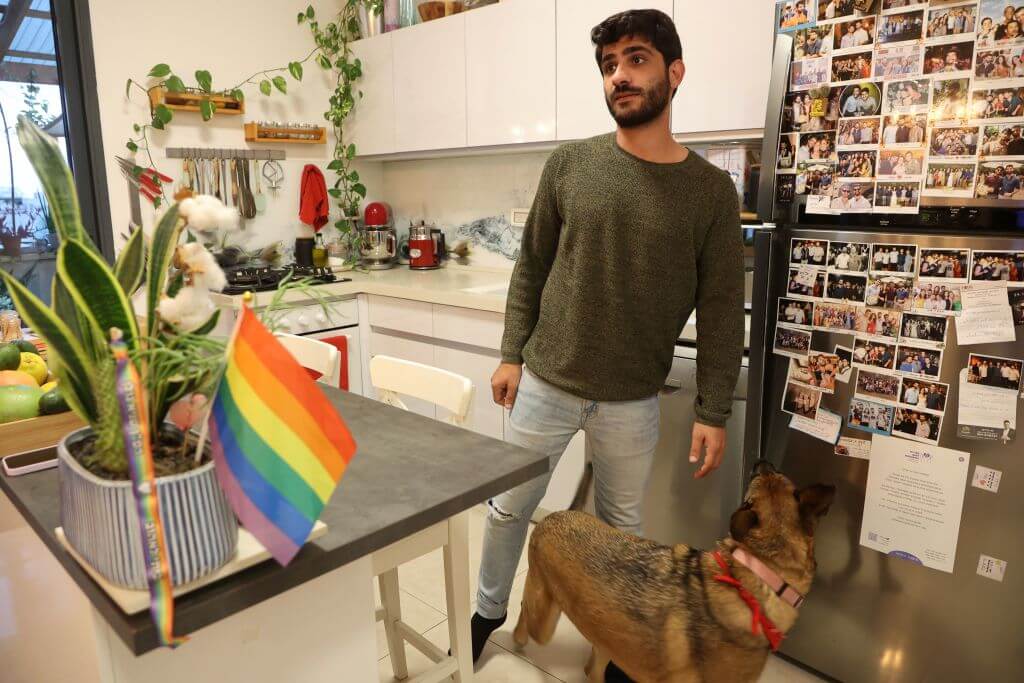‘As We See It’ features a ‘Jewish heartthrob’ and other actors on the spectrum

A scene from “As We See It” By Goldstein/Amazon
On a typical television soundstage, a loud bell alerts the cast and crew that filming is about to begin and they must be quiet. On the set of “As We See It,” a new series streaming on Amazon Prime, Elaine Hall made sure the producers gave the actors warning before the bell rang — and noise-cancellation headphones.
“When you’re highly sensitive to sound, it can really cause a disruption,” Hall said.
“As We See It” follows three neurodiverse young adults living as roommates and the neurotypical woman, also a young adult with her own challenges, looking out for them.
The eight-episode series, which debuted last month, has won praise for avoiding schmaltzy depictions of the daily challenges facing three 20-somethings living with autism, and for casting neurodiverse actors as the three neurodiverse leads.
And in a Hollywood increasingly insistent of authentic on-screen representations of certain races, ethnicities and sexual orientations, that’s significant.
Hall, founder and artistic director of the Los Angeles-based [Miracle Project], which has long offered online Judaica social skills classes, served as an on-set advocate and access coordinator on the set of the show, a heartwarming blend of humor and drama created by TV writer Jason Katims (“Friday Night Lights”).
Katims, whose son is autistic, adapted the series from the Israeli comedy, “On the Spectrum.”
“It was just an amazing experience,” Hall said in a phone interview about filming the series. “It was one of the kindest, most respectful sets I have ever worked on.”
The trio of actors portraying the three leads are Rick Glassman, a comic who has described himself as a “Jewish heartthrob” on Instagram, newcomer Albert Rutecki and Sue Ann Pien.
In the series’ pilot, Ann Pien’s character, Violet, is working at an Arby’s and, determined to date a guy not on the spectrum, propositions one of her customers. The man’s wife overhears and isn’t happy.
Glassman’s character, Jack, highly intelligent but without a filter, is fired from his job after calling his boss intellectually inferior. Rutecki’s agoraphobic Harrison, sensitive to loud noises, struggles to walk on his own to the corner coffee shop.
Get the Forward’s “Letter from California” delivered to your inbox. Sign up here to receive our lively and provocative insights, news, opinion and inspiration from the state at the leading edge of the Jewish future.
Hall said the feedback from the autistic community has been overwhelmingly positive.
“I think it so delicately portrays their relationship with the outer world,” she said.
The lives of the three autistic leads intermingle with the lives of the series’ neuro-typical characters, including Mandy, played by Sosie Bacon (daughter of Kevin Bacon), whose job is to watch the three young adults, and Violet’s overprotective brother, played by Chris Pang (“Crazy Rich Asians”).
In the pilot, Mandy receives a rejection letter from Duke University. When she shares the disappointing news with her boyfriend, he invites her to move to Berkeley with him. Mandy, passionate about her work supervising the three autistic 20-somethings, has not made a decision about whether she will stay or go by the conclusion of the first episode, though signs point to her staying.
Also appearing in the series is veteran actor Joe Mantegna, the father of one of the three leads. Dying of cancer, he wants to be sure his son can care for himself when he’s gone. Over pizza, he tries discussing this with his son, who just wants to focus on his slices of cheese.
In addition to ensuring the show’s Los Angeles set was safe and accessible, Hall was responsible for reviewing the language of the script, seeing it was accurate and respectful of the neurodiverse community. This, it turned out, was not a big job.
“When I read the scripts, there were such minor suggestions I would give,” she said.

Elaine Hall Courtesy of Elaine Hall
Hall, who before establishing the Miracle Project was a children’s acting coach, also got an acting credit: she appears in the series’ third episode as, what else, an acting coach in one of the character’s drama clubs.
Several actors appear from the Miracle Project, founded by Hall in 2004 to provide fully inclusive theater, film and social skills to individuals with autism and all abilities.
Hall, who noted that February is Jewish Disabilities Awareness, Acceptance and Inclusion Month, said “As We See It” provides an opportunity to better understand neurodiverse characters on-screen.
“It’s a mirror of authentic experiences of people on the spectrum,” Hall said. “It’s not about changing the person with autism, but about understanding their perspective and allowing truth.It’s all in there, and it’s so real.”
A message from our Publisher & CEO Rachel Fishman Feddersen

I hope you appreciated this article. Before you go, I’d like to ask you to please support the Forward’s award-winning, nonprofit journalism so that we can be prepared for whatever news 2025 brings.
At a time when other newsrooms are closing or cutting back, the Forward has removed its paywall and invested additional resources to report on the ground from Israel and around the U.S. on the impact of the war, rising antisemitism and polarized discourse.
Readers like you make it all possible. Support our work by becoming a Forward Member and connect with our journalism and your community.
— Rachel Fishman Feddersen, Publisher and CEO





























